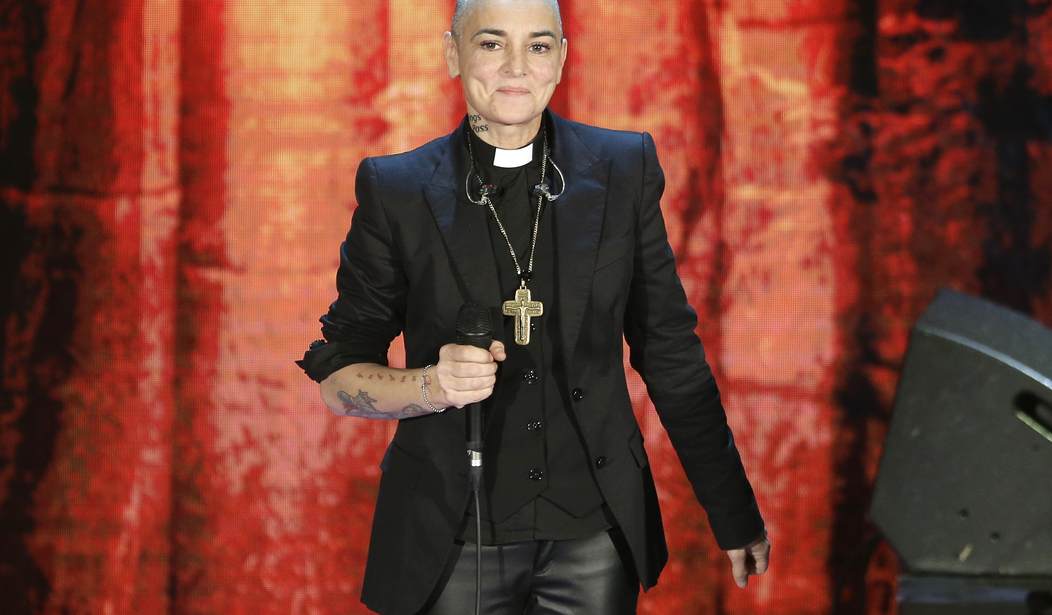Such a striking voice, such a talented songwriter, such a troubled individual, Sinéad O’Connor is dead at the age of 56.
O’Connor’s cause of death hasn’t been announced as I write these words but I reacted to the news with the same utter lack of surprise when George Michael died on Christmas Day, 2016. Apparently deeply unhappy, Michael had been casually working towards ending it all with a combination of drugs and anonymous sex. With her troubled history, it was my sad conclusion 30 years ago that O’Connor would not live a terribly long life.
She hit the big time with her 1990 cover of Prince’s “Nothing Compares 2 U” from her second album, “I Do Not Want What I Haven’t Got.”
If “Nothing Compares 2 U” was a haunting but fairly traditional heartache ballad, you could see the seeds of O’Connor’s troubles in the album’s fourth track, “The Emperor’s New Clothes.” Released as the follow-up single, it details her love, her struggle with sudden fame, and a protest against an unspecified “they” who are ruining her life. The song opens with a scene of domestic troubles:
It seems years since you held the baby
While I wrecked the bedroom
You said it was dangerous after Sunday
And I knew you loved me
He thinks I just became famous
And that’s sure to mess me up
But he’s wrong
How could I possibly know what I want
When I was only twenty-one?
“I Do Not Want What I Haven’t Got” was a huge seller around the world, although I never thought it was as solid all the way through as her 1987 debut album, “The Lion And The Cobra.”
I was watching MTV with my roommate at Mizzou in the early weeks of 1988 when they played the video to her first (minor) hit, “Mandinka.”
My buddy Dave and I were so caught up in the song that we actually shut up for three-and-a-half minutes to take it all in. When the video was over, Dave called her performance “fearless,” and I had to agree. I bought the album that same week, and all nine songs have been in my regular rotation for 35 years.
But in real life, O’Connor was anything but fearless.
Her various demons drove her to tear up a photo of Pope John Paul II at the end of a performance on SNL, saying, “Fight the real enemy.” By the time of her death she’d had four husbands, been ordained as a priest in the Latin Tridentine Church, converted to Islam, changed her name to Magda Davitt and then to Shuhada Sadaqat, and been involved in too many newsworthy controversies to count.
I quit buying her albums after the second one. On the TV series “How I Met Your Mother,” ladies’ man Barney Stinson had his Hot/Crazy Scale for determining how attractive a woman had to be to make up for how crazy she was. I have something similar for recording artists: Steve’s Talented/Crazy Matrix.
By the time O’Connor ripped up that photo of the Pope — combined with, to my taste, the decreased quality of her music — I lost interest. The same thing happened between Michael Jackson and myself around the same time, with the release of “Dangerous” in 1991.
Still, I’ll always be grateful to O’Connor for her sit-up-and-make-you-listen debut album, and for about half of her second one. Whatever her demons were, and I won’t pretend to even really want to understand them, maybe today she’s at long last found some peace.
I’ll wrap this with one of her most electrifying songs, all-too-appropriately titled “Never Get Old.”
Recommended: ‘If We Never Meet Again…’ Tony Bennett Passes at 96










Join the conversation as a VIP Member